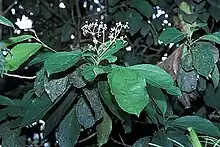Hasseltia
Hasseltia is a genus of flowering plants in the family Salicaceae. It contains four species of small to medium-sized trees native to the neotropics, ranging from Mexico south to Brazil and Bolivia.[1] The genus is named for the Dutch physician and botanist Johan Conrad van Hasselt.
| Hasseltia | |
|---|---|
 | |
| Hasseltia floribunda | |
| Scientific classification | |
| Kingdom: | Plantae |
| Clade: | Tracheophytes |
| Clade: | Angiosperms |
| Clade: | Eudicots |
| Clade: | Rosids |
| Order: | Malpighiales |
| Family: | Salicaceae |
| Subfamily: | Salicoideae |
| Tribe: | Prockieae |
| Genus: | Hasseltia Kunth |
| Type species | |
| Hasseltia floribunda Kunth | |
| Species | |
| |
Hasseltia is unique among Salicaceae in that the species have pseudo-axile placentation, compound umbellate inflorescences, and a pair of glands embedded in the base of the leaf blades.[1] Formerly placed in the heterogeneous family Flacourtiaceae,[2] Hasseltia is now classified in Salicaceae, along with close relatives Pleuranthodendron and Macrothumia, with which they are commonly confused.[1][3][4]
References
- Alford, M.H. 2006. A new species of Hasseltia (Salicaceae) from Costa Rica and Panama. Brittonia 58(3): 277-284.
- Sleumer, H.O. 1980. Flacourtiaceae. Flora Neotropica 22: 1-499.
- Alford, M. H. 2003. Claves para los géneros de Flacourtiaceae de Perú y del Nuevo Mundo. Arnaldoa 10: 19-38.
- Gentry, A. H. 1993. A Field Guide to the Families and Genera of Woody Plants of Northwest South America (Colombia, Ecuador, Peru). Chicago: University of Chicago Press.
This article is issued from Wikipedia. The text is licensed under Creative Commons - Attribution - Sharealike. Additional terms may apply for the media files.